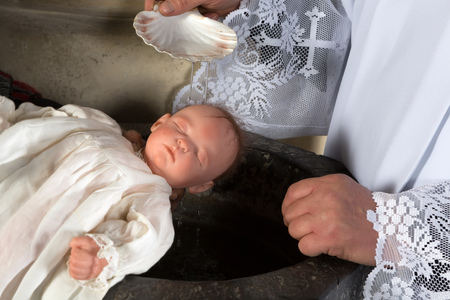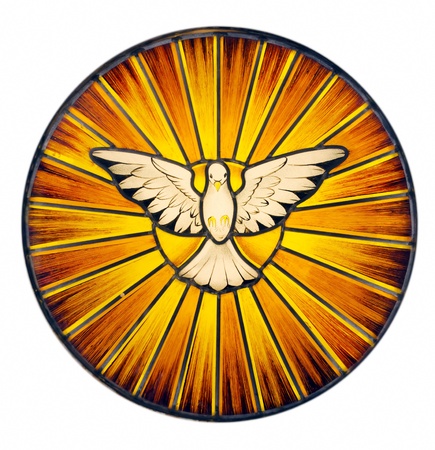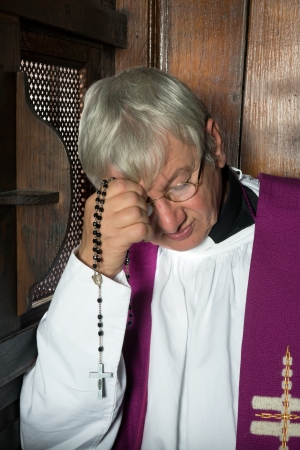Baptism

Please make appointment at least one month prior
Holy Baptism is the basis of the whole Christian life,
the gateway to life in the Spirit and the door which gives access to the other sacraments. Through Baptism we are freed from sin and reborn as people of God; we become members of Christ, are incorporated into the Church and made sharers in her mission: “Baptism is the sacrament of regeneration through water in the word.” (Catechism of the Catholic Church #1213)
Please note that the Code of Canon Law requires Godparents to be Catholic. Only a Catholic can support and guide those being baptised in the Catholic faith. If in extreme cases a non-Catholic is asked to sponsor the child they will be listed as a witness. Please talk to the priest or deacon regarding Godparents.
Applications
If you are seeking Baptism please make an appointment through the parish office. Also please note that one month’s notice is required. The sacrament is celebrated at 10:30am following Mass on 2nd & 4th Sundays of the month. Call or Email the office for registration.
See below for application forms.
Applications
Double click to open pdf and download to your computer. Fill in the form and email it to secretary@stbernadettescarlton.org.au
Reconciliation
Why is Reconciliation Necessary?
The sacrament of Reconciliation is also known as Penance and Confession, among other names. (There is an explanation of some of these names in the Catechism’s section on the sacrament of Reconciliation.) Although often called Reconciliation in common usage, the term “penance” best describes the essential interior disposition required for this sacrament. In fact, there is a virtue of penance.
This is a supernatural virtue by which we are moved to detest our sins seeing them from God’s perspective or in other words from a motive made known by faith. It is accompanied by a purpose of not offending God again and of making reparation for our sins. In this sense the word “penance” is synonymous with “penitence” or “repentance.” Before the time of Christ the virtue of penance was the only means by which people’s sins could be forgiven. Even today, for those outside the Church in good faith, not possessing the sacrament of Penance, it is the only means for forgiveness of sins.
Continuing the work of redemption
The sacrament of Reconciliation is a sacrament in which the priest, as the agent of God, forgives sins committed after Baptism, when the sinner is truely sorry for them, sincerely confesses them, and is willing to make satisfaction for them. By his death on the Cross, Jesus Christ redeemed man from sin and from the consequences of his sin, especially from the eternal death that is due to sin. So it is not surprising that on the very day he rose from the dead, Jesus instituted the sacrament by which men’s sins could be forgiven.
It was on Easter Sunday evening that Jesus appeared to his Apostles, gathered together in the Upper Room, where they had eaten the Last Supper. As they gaped and shrank back in a mixture of fear and dawning hope, Jesus spoke to them reassuringly. Jesus came and stood in the midst and said to them, ‘Peace be to you!’ And when he had said this he showed them his hands and his side. The disciples therefore rejoiced at the sight of the Lord. He therefore said to them again, ‘Peace be to you! As the Father has sent Me, I also send you.’ When he had said this, he breathed upon them, and said to them, ‘Receive the Holy Spirit; whose sins you shall forgive, they are forgiven them; and whose sins you shall retain, they are retained.’ John (20:19-23)
“Sacraments are “powers that comes forth” from the Body of Christ, which is ever-living and life-giving.”
Catechism of the Catholic Church 1116
Confirmation

Children from our Parish will be referred to St Patrick’s Church Kogarah or St Michael’s Parish Hurstville for the Sacrament of Confirmation.
Just as bodies and minds grow
Catholics believe that the soul also needs to grow in the life of grace. The sacrament of Confirmation builds on the sacraments of Baptism, Penance, and Holy Communion, completing the process of initiation into the Catholic community.
What the Catholic Sacrament of Confirmation means
Confirmation, a sacrament of initiation, establishes young adults as full-fledged members of the faith. This sacrament is called Confirmation because the faith given in Baptism is now confirmed and made strong. During your Baptism, your parents and godparents make promises to renounce Satan and believe in God and the Church on your behalf. At Confirmation, you renew those same promises, this time speaking for yourself.
During Confirmation, the focus is on the Holy Spirit, who confirmed the apostles on Pentecost and gave them courage to practice their faith. Catholics believe that the same Holy Spirit confirms Catholics during the Sacrament of Confirmation and gives them the same gifts.
Traditionally, the seven gifts of the Holy Spirit are wisdom, understanding, counsel, fortitude (courage), knowledge, piety, and fear of the Lord. These gifts are supernatural graces given to the soul. The 12 fruits are charity (or love), joy, peace, patience, benignity (or kindness), goodness, longanimity (or long-suffering), mildness (or gentleness), faith, modesty, continency (or self-control), and chastity.
The Catholic Ritual of Confirmation
The Confirmation ceremony may take place at Mass or outside of Mass, and the presiding bishop wears red vestments to symbolize the red tongues of fire seen hovering over the heads of the apostles at Pentecost. Each person wishing to be confirmed comes forward with his or her sponsor, who may or may not be one of the godparents chosen for Baptism. The bishop anoints the candidates on the forehead with the oil of sacred chrism saying “Receive the gift of the Holy Spirit!”














